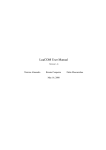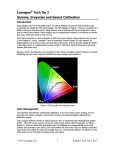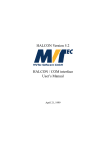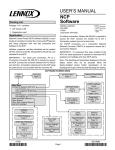Download LuaCOM User Manual - PUC-Rio
Transcript
LuaCOM User Manual
Version 1.0 (beta2)
Vinicius Almendra
Renato Cerqueira
3rd December 2002
Contents
1
Introduction
2
2
Features
2
3
How to use
3
4
LuaCOM Elements
4.1 LuaCOM API . . . . . . . . . . . . . . . . . . . . . .
4.2 LuaCOM objects . . . . . . . . . . . . . . . . . . . .
4.3 ActiveX binding . . . . . . . . . . . . . . . . . . . . .
4.3.1 Implementing dispinterfaces in Lua . . . . .
4.3.2 Using Methods and Properties . . . . . . . . .
4.3.3 Connection Points . . . . . . . . . . . . . . .
4.3.4 Parameter Passing . . . . . . . . . . . . . . .
4.3.5 Exception Handling . . . . . . . . . . . . . .
4.4 Type Conversion . . . . . . . . . . . . . . . . . . . .
4.4.1 Numeric types . . . . . . . . . . . . . . . . .
4.4.2 Strings . . . . . . . . . . . . . . . . . . . . .
4.4.3 Boolean values . . . . . . . . . . . . . . . . .
4.4.4 Pointers to IDispatch and LuaCOM objects
4.4.5 Pointers to IUnknown . . . . . . . . . . . . .
4.4.6 Arrays and Tables . . . . . . . . . . . . . . .
4.4.7 CURRENCY type . . . . . . . . . . . . . . . .
4.4.8 The DATE type . . . . . . . . . . . . . . . . .
4.4.9 Error Handling . . . . . . . . . . . . . . . . .
.
.
.
.
.
.
.
.
.
.
.
.
.
.
.
.
.
.
.
.
.
.
.
.
.
.
.
.
.
.
.
.
.
.
.
.
.
.
.
.
.
.
.
.
.
.
.
.
.
.
.
.
.
.
.
.
.
.
.
.
.
.
.
.
.
.
.
.
.
.
.
.
.
.
.
.
.
.
.
.
.
.
.
.
.
.
.
.
.
.
.
.
.
.
.
.
.
.
.
.
.
.
.
.
.
.
.
.
.
.
.
.
.
.
.
.
.
.
.
.
.
.
.
.
.
.
.
.
.
.
.
.
.
.
.
.
.
.
.
.
.
.
.
.
.
.
.
.
.
.
.
.
.
.
.
.
.
.
.
.
.
.
.
.
.
.
.
.
.
.
.
.
.
.
.
.
.
.
.
.
.
.
.
.
.
.
.
.
.
.
.
.
.
.
.
.
.
.
.
.
.
.
.
.
.
.
.
.
.
.
.
.
.
.
.
.
.
.
.
.
.
.
.
.
.
.
.
.
.
.
.
.
.
.
.
.
.
.
.
.
.
.
.
.
.
.
.
.
.
.
.
.
.
.
.
.
.
.
.
.
.
.
.
.
.
.
.
.
.
.
.
.
.
.
.
.
.
.
.
.
.
.
.
.
.
.
.
.
3
4
6
7
7
9
11
12
15
15
15
15
15
16
16
16
16
16
16
Release Information
5.1 Limitations . . . . .
5.2 Known bugs . . . . .
5.3 Future Enhancements
5.4 History . . . . . . .
5.4.1 Version 0.9.2
5.4.2 Version 0.9.1
.
.
.
.
.
.
.
.
.
.
.
.
.
.
.
.
.
.
.
.
.
.
.
.
.
.
.
.
.
.
.
.
.
.
.
.
.
.
.
.
.
.
.
.
.
.
.
.
.
.
.
.
.
.
.
.
.
.
.
.
.
.
.
.
.
.
.
.
.
.
.
.
.
.
.
.
.
.
.
.
.
.
.
.
.
.
.
.
.
.
.
.
.
.
.
.
17
17
17
18
18
18
18
5
.
.
.
.
.
.
.
.
.
.
.
.
.
.
.
.
.
.
.
.
.
.
.
.
.
.
.
.
.
.
.
.
.
.
.
.
.
.
.
.
.
.
.
.
.
.
.
.
.
.
.
.
.
.
.
.
.
.
.
.
1
.
.
.
.
.
.
.
.
.
.
.
.
.
.
.
.
.
.
.
.
.
.
.
.
.
.
.
.
.
.
.
.
.
.
.
.
.
.
.
.
.
.
.
.
.
.
.
.
6
7
1
Reference
6.1 The C/C++ API . . . . . . . . . . . . . .
6.1.1 luacom open . . . . . . . . . . .
6.1.2 luacom close . . . . . . . . . . .
6.1.3 luacom IDispatch2LuaCOM . . .
6.2 The Lua API . . . . . . . . . . . . . . .
6.2.1 luacom CreateObject . . . . . . .
6.2.2 luacom Connect . . . . . . . . .
6.2.3 luacom ImplInterface . . . . . . .
6.2.4 luacom ImplInterfaceFromTypelib
6.2.5 luacom GetObject . . . . . . . .
6.2.6 luacom NewObject . . . . . . . .
6.2.7 luacom ExposeObject . . . . . .
6.2.8 luacom addConnection . . . . . .
6.2.9 luacom releaseConnection . . . .
6.2.10 luacom ProgIDfromCLSID . . .
6.2.11 luacom CLSIDfromProgID . . .
6.2.12 luacom ShowHelp . . . . . . . .
6.2.13 luacom GetIUnknown . . . . . .
6.2.14 luacom isMember . . . . . . . .
.
.
.
.
.
.
.
.
.
.
.
.
.
.
.
.
.
.
.
.
.
.
.
.
.
.
.
.
.
.
.
.
.
.
.
.
.
.
.
.
.
.
.
.
.
.
.
.
.
.
.
.
.
.
.
.
.
.
.
.
.
.
.
.
.
.
.
.
.
.
.
.
.
.
.
.
.
.
.
.
.
.
.
.
.
.
.
.
.
.
.
.
.
.
.
.
.
.
.
.
.
.
.
.
.
.
.
.
.
.
.
.
.
.
.
.
.
.
.
.
.
.
.
.
.
.
.
.
.
.
.
.
.
.
.
.
.
.
.
.
.
.
.
.
.
.
.
.
.
.
.
.
.
.
.
.
.
.
.
.
.
.
.
.
.
.
.
.
.
.
.
.
.
.
.
.
.
.
.
.
.
.
.
.
.
.
.
.
.
.
.
.
.
.
.
.
.
.
.
.
.
.
.
.
.
.
.
.
.
.
.
.
.
.
.
.
.
.
.
.
.
.
.
.
.
.
.
.
.
.
.
.
.
.
.
.
.
.
.
.
.
.
.
.
.
.
.
.
.
.
.
.
.
.
.
.
.
.
.
.
.
.
.
.
.
.
.
.
.
.
.
.
.
.
.
.
.
.
.
.
.
.
.
.
.
.
.
.
.
.
.
.
.
.
.
.
.
.
.
.
.
.
.
.
.
.
.
.
.
.
.
.
.
.
.
.
.
.
.
.
.
.
.
.
.
.
.
.
.
.
.
.
.
.
.
.
.
.
.
.
.
.
.
.
.
.
.
.
.
.
.
.
.
.
.
.
.
.
.
.
.
.
.
.
.
.
.
.
.
.
.
.
.
.
.
.
.
.
.
.
Credits
.
.
.
.
.
.
.
.
.
.
.
.
.
.
.
.
.
.
.
.
.
.
.
.
.
.
.
.
.
.
.
.
.
.
.
.
.
.
.
.
.
.
.
.
.
.
.
.
.
.
.
.
.
.
.
.
.
18
18
18
19
20
20
20
21
22
23
24
25
26
26
27
28
29
29
29
30
31
Introduction
LuaCOM is an add-on library to the Lua language that allows Lua programs to use and implement
objects that follow Microsoft’s Component Object Model (COM) specification and use the ActiveX
technology for property access and method calls.
2
Features
Currently, the LuaCOM library supports the following features:
• dynamic creation of COM objects registered in the system registry, via the luacom_CreateObject
function;
• dynamic access to running COM objects via the luacom_GetObject;
• COM method calls as normal Lua function calls;
• property access as normal table field access;
• type conversion between OLE Automation types and Lua types for almost all types;
• object disposal using Lua garbage collection mechanism;
• implementation of COM interfaces and objects using Lua tables;
• use of COM connection point mechanism to handle bidirecional communication and event handling;
• fully compatible with Lua 4.
2
3
How to use
Using LuaCOM is straightforward: you just have to link your program with LuaCOM’s library, include the LuaCOM’s header — luacom.h — and call the propter initialization and termination
functions before using any of LuaCOM’s functionalities. Here is an example of a simple C program
using LuaCOM.
/*
* Sample C program using luacom
*/
#include <stdio.h>
#include <ole2.h> // needed for OleInitialize and OleUninitialize
#include <lua.h>
#include "luacom.h"
int main (int argc, char *argv[]) {
/* COM initialization */
CoInitialize(NULL);
/* library initialization */
lua_State *L = lua_open(0);
luacom_open(L);
if(lua_dofile("activex_sample.lua") != 0) {
puts("Error running sample.lua!");
exit(1);
}
luacom_close(L);
lua_close(L);
CoUninitialize(NULL);
return 0;
}
Notice that it’s necessary to initialize COM before luacom open and to “uninitialize” only after the
last lua_close, otherwise exceptions will occurr.
4
LuaCOM Elements
LuaCOM is composed by the following elements:
• LuaCOM API, used primarily to initialize the library, create objects, implement ActiveX interfaces in Lua and to manipulate connection points;
• LuaCOM objects, which make available in Lua ActiveX objects and interfaces;
• ActiveX binding, which translates accesses on LuaCOM objects to ActiveX interface calls and
ActiveX accesses on an inteface implemented in Lua to Lua function calls or table accesses;
3
• LuaCOM type conversion rules, which govern the type conversion between Lua and ActiveX
values;
• LuaCOM parameters passing rules, which describe how LuaCOM translate a Lua parameter
list to a COM one and vice versa.
4.1
LuaCOM API
Currently, the LuaCOM API is divided in two parts: the Lua API and the C/C++ API. The C/C++
API is used primarily for initialization of the library and for low-level construction of LuaCOM
objects. The Lua API permits Lua programs to access all the functionality of LuaCOM. Below there
is summary of the LuaCOM API. Detailed information on these functions is available at section 6.
4
Lua API
Description
Creates a LuaCOM object
Function
luacom_CreateObject
luacom_NewObject
Creates a LuaCOM object implemented
in Lua
luacom_GetObject
Creates a LuaCOM object associated
with an instance of an already running
ActiveX object
luacom_ExposeObject
Exposes a LuaCOM object, so that other
applications can get a reference to it
luacom_RevokeObject
Undoes the operation of
luacom ExposeObject
Fills in the registry entries necessary for
exposing a COM object.
luacom_RegisterObject
Creates a connection point between an
object and a Lua table
luacom_Connect
Implements an IDispatch interface using a
Lua table
luacom_ImplInterface
luacom_ImplInterfaceFromTypelib
Implements an IDispatch interface
described in a Type Library using a Lua
table
Connects two LuaCOM objects
luacom_addConnection
luacom_releaseConnection
Disconnects a LuaCOM object from its
connection point
luacom_isMember
Checks whether a name correspond to a
method or a property of an LuaCOM
object
luacom_ProgIDfromCLSID
Gets the ProgID associated with a CLSID
luacom_CLSIDfromProgID
Gets the CLSID associated with a ProgID
Returns an IUnknown interface to a
LuaCOM object as a userdata.
luacom_GetIUnknown
5
C/C++ API
Description
Initializes the LuaCOM library in a
Lua state. It must be called before any
use of LuaCOM features.
Function
luacom_open
LuaCOM’s termination function
luacom_close
Takes an IDispatch interface and
creates a LuaCOM object to expose it,
pushing the object on the Lua stack.
luacom_IDispatch2LuaCOM
4.2
LuaCOM objects
LuaCOM deals with LuaCOM objects, which are no more than a Lua table with the LuaCOM tag
and a reference to the LuaCOM C++ object; this one is, in turn, a proxy for the ActiveX object: it
holds an IDispatch pointer to the object and translates Lua accesses to ActiveX calls and property
accesses. Here is a sample where a LuaCOM object is used:
-- Instantiate a Microsoft(R) Calendar Object
calendar = luacom_CreateObject("MSCAL.Calendar")
-- Error check
if calendar == nil then
print("Error creating object")
exit(1)
end
-- Method call
calendar:AboutBox()
-- Property Get
current_day = calendar.Day
-- Property Put
calendar.Month = calendar.Month + 1
print(current_day)
print(calendar.Month)
LuaCOM objects can be created using the LuaCOM Lua API; there are a number of function that
return LuaCOM objects. The most relevant ones are luacom_CreateObject and luacom_GetObject.
Then may also be created on implicitly, when a return or output value of a COM method is a dispinterface.
LuaCOM objects are released through Lua’s garbage collection mechanism, so there isn’t any
explicit API function to destroy them.
6
A LuaCOM object may be passed as an argument to method calls on other LuaCOM objects, if
these methods expect an argument of type dispinterface. Here is a sample to ilustrate this situation:
-- Gets a running instance of Excel
excel = luacom_GetObject("Excel.Application")
-- Gets the set of worksheets
sheets = excel.Worksheets
-- gets the first two sheets
sheet1 = sheets.Item(1)
sheet2 = sheets.Item(2)
-- Exchange them (here we pass the second sheet as a parameter
-- to a method)
sheet1:Move(nil, sheet2)
4.3
ActiveX binding
The ActiveX binding is responsible for translating the table accesses to the LuaCOM object to
ActiveX interface calls. Besides that, it also provides a mechanism for implementing ActiveX dispinterfaces using ordinary Lua tables.
4.3.1
Implementing dispinterfaces in Lua
The ActiveX binding has a C++ class that implements a generic IDispatch interface. The implementation of this class translates the method calls and property accesses done on the objects of this
class to Lua calls and table accesses. So, one may implement an ActiveX interface entirely in Lua
provided it has a type library describing it. This type library may be a stand-alone one (referenced by
its location on the filesystem) or may be associated with some registered component. In this case, it
may be refenced by the ProgID of the component.
The C++ objects of this class can be used in any place where a IDispatch or IUnknown
interface is expected. Follows a sample of implementing ActiveX dispinterfaces in Lua.
-- Creates and fills the Lua table that will implement the
-- ActiveX interface
events_table = {}
function events_table:AfterUpdate()
print("AfterUpdate called!")
end
-- Here we implement the interface DCalendarEvents, which is part
-- of the Microsoft(R) Calendar object, whose ProgID is MSCAL.Calendar
events_obj = luacom_ImplInterface(
7
events_table,
"MSCAL.Calendar",
"DCalendarEvents")
-- Checks for errors
-if events_obj == nil then
print("Implementation failed")
exit(1)
end
-- Tests the interface: this must generate a call to the events:AfterUpdate
-- defined above
-events_obj:AfterUpdate()
If the interface to be implemented is described in a stand-alone type library, the function luacom_ImplInterfac
must be used instead:
-- Creates and fills the Lua table that will implement the
-- ActiveX interface
hello_table = {}
function hello:Hello()
print("Hello World!")
end
-- Here we implement the interface IHello
-hello_obj = luacom_ImplInterfaceFromTypelib("hello.tlb","IHello")
-- Checks for errors
-if hello_obj == nil then
print("Implementation failed")
exit(1)
end
-- Tests the interface
-hello_obj:Hello()
Both functions return a LuaCOM object, whose corresponding ActiveX object is implemented
by the supplied table. So, any Lua calls to this LuaCOM object will be translated to ActiveX calls
which, in turn, will be translated back to Lua calls on the implementation table. This LuaCOM object
8
can be passed as an argument to ActiveX methods who expect a dispinterface or to LuaCOM API
functions (like luacom_addConnection).
One can also use the luacom_NewObject function, which is best suited to the situation where
one needs to create a complete ActiveX object in Lua and wants to export it, so that it can be accessed
through COM by any running application.
4.3.2
Using Methods and Properties
The ActiveX interfaces have two “types” of members: properties and methods. LuaCOM deals with
both, although there may be some limitations not shown here (see chapter 5).
Method accesses are done in the same way as calling Lua functions stored in a table and having a
“self” parameter:
obj = luacom_CreateObject("TEST.Test")
if obj == nil then
exit(1)
end
-- method call
a = obj:Teste(1,2)
-- another one
obj:Teste2(a+1)
It’s important to notice the need of using the colon – “:” – for method calls. Although LuaCOM
does not use the self parameter that Lua passes in this case, its presence is assumed, that is,
LuaCOM always skips the first parameter in the case of method calls. Forgetting it may cause nasty
bugs.
Accessing properties is much like the same of accessing fields in Lua tables:
obj = luacom_CreateObject("TEST.Test")
if obj == nil then
exit(1)
end
-- property access
a = obj.TestData
-- property setting
obj.TestData = a + 1
Here we have just the opposite: it’s necessary to use a dot – “.” – to access properties. Using a
colon may also cause bugs, as LuaCOM blindly ignores (or uses) the first parameter, depending on
the expected type of access (method call or property access)1 .
1
LuaCOM gets this information, whether it’s a property or a method, from the type information of the member being
9
Indexed Properties The ActiveX standard allows properties to have parameters. In fact, the properties are much like methods with a restricted form.
To read an indexed property, one must access the property as a method, passing the parameters,
but using the dot, instead of the colon:
-- reading an indexed method
x = obj.Test(1)
To write to an indexed property is analogous, just passing the value to be set as another parameter,
following the index:
-- write the property: first the index(es), them the value
obj.Test(1,"a")
It’s important to notice that LuaCOM distinguishes the read and write accesses by the number of
parameters.
Property Access in Lua When implementing a COM interface in Lua, LuaCOM also supports the
concept of property and of indexed properties. LuaCOM translate property reads and writes to table
field accesses:
interface = {}
interface.Test = 1
interface.TestIndex = {2,3}
obj = luacom_ImplInterface(interface, "TEST.Test", "ITest")
-- must print "1"
print(obj.Test)
-- must print nil (if there is no member named Test2)
print(obj.Test2)
-- this writes the filed Test
obj.Test = 1
-- Indexed property read. Must return 3 (remember that
-- indexed tables start at 1 in Lua)
i = obj.TestIndex(2)
-- Sets the indexed field
obj.TestIndex(2,4)
-- Now must return 4
i = obj.TestIndex(2)
used.
10
4.3.3
Connection Points
The connection points are a standard ActiveX mechanism whose primary objective is to allow the
ActiveX object to notify its owner of any kind of events. The connection point works as an “event
sink”, where events and notifications go through.
To establish a connection using LuaCOM, the owner of the ActiveX object must create a table
to implement the connection interface, whose description is provided by the ActiveX object (this
interface is called a source interface) and then call the API function luacom_Connect, passing
as arguments the LuaCOM object for the ActiveX object and the implementation table. Doing this,
LuaCOM will automatically find the default source interface, create a LuaCOM object implemented
by the supplied table and then connect this object to the ActiveX object. Here follows a sample:
-- Creates the ActiveX object
-calendar = luacom_CreateObject("MSCAL.Calendar")
if calendar == nil then
exit(1)
end
-- Creates implementation table
-calendar_events = {}
function calendar_events:AfterUpdate()
print("Calendar updated!")
end
-- Connects object and table
-res = luacom_Connect(calendar, calendar_events)
if res == nil then
exit(1)
end
-- This should trigger the AfterUpdate event
-calendar:NextMonth()
It’s also possible to separately create a LuaCOM object implementing the connection point source
interface and then connect it to the object using luacom_AddConnection.
-- Creates the ActiveX object
-calendar = luacom_CreateObject("MSCAL.Calendar")
11
if calendar == nil then
print("Error instantiating calendar")
exit(1)
end
-- Creates implementation table
-calendar_events = {}
function calendar_events:AfterUpdate()
print("Calendar updated!")
end
-- Creates LuaCOM object implemented by calendar_events
-event_handler = luacom_ImplInterface(calendar_events,
"MSCAL.Calendar",
"DCalendarEvents")
if event_handler == nil then
print("Error implementing DCalendarEvents")
exit(1)
end
-- Connects both objects
-luacom_addConnection(calendar, event_handler)
-- This should trigger the AfterUpdate event
-calendar:NextMonth()
-- This disconnects the connection point established
-luacom_releaseConnection(calendar)
-- This should NOT trigger the AfterUpdate event
-calendar:NextMonth()
4.3.4
Parameter Passing
LuaCOM has some policies concerning parameter passing. They specify how LuaCOM will translate COM parameter lists to Lua and vice-versa. There are two differente situations to which these
policies apply: calling a method of a COM object from Lua and calling a Lua function from COM.
The main question here is how to deal with the different types of parameters supported by COM
(“in” parameters, “out” parameters, “in-out” parameters, “optional” parameters and “defaultvalue”
parameters).
12
Calling COM from Lua This situation happens when the accessing a property or calling a method
of a COM object through the LuaCOM object. Here follows a sample:
word = luacom_GetObject("Word.Application")
-- Here we are calling the "Move" method of the Application object of
-- a running instance of Microsoft(R) Word(R)
word:Move(100,100)
In this situation, there are two steps in the parameter passing process:
1. convert Lua parameters to COM (this will be called the “lua2com” situation);
2. convert COM’s return value and output values back to Lua (this will be called the “com2lua”
situation).
lua2com situation The translation is done based on the type information of the method (or
property); it’s done following the order the parameters appear in the type information of the method.
The Lua parameters are used in the same order. For each parameter there are three possibilities:
The parameter is an “in” parameter LuaCOM gets the first Lua parameter not yet converted and
converts it to COM using LuaCOM type conversion engine.
The parameter is an “out” parameter LuaCOM ignores this parameter, as it will only be filled by
the called method. That is, the “out” parameters SHOULD NOT appear in the Lua parameter
list.
The parameter is an “in-out” parameter LuaCOM does the same as for “in” parameters.
When the caller of the method wants to omit a parameter, it must pass the nil value; LuaCOM
then proceeds accordingly, informing the called method about the omission of the parameter. If the
parameter has a default value, it is used instead. Notice that LuaCOM does not complain when one
omits non-optional parameters. In fact, LuaCOM ignores the fact that a parameter is or isn’t optional.
It leaves the responsibility for checking this to the implementation of the called method.
com2lua situation When the called method finishes, LuaCOM translates the return value and
the output values (that is, the values of the “out” parameters) to Lua return values. That is, the method
return value is return to the Lua code as the first return value; the output values are returned in the
order they appear in the parameter list (notice that here we use the Lua feature of multiple return
values). If the method does not have return values, that is, is a “void” method, the return values will
the output values. If there are no output values either, then there will be no return values.
The called method can omit the return value or the output values; LuaCOM them will return nil
for each omitted value.
To illustrate these concepts, here follows a sample of these situations. First, we show an excerpt
of an ODL file describing some methods of a COM object:
HRESULT TestShort(
[in] short p1, // an "in" parameter
[out] short* p2, // an "out" parameter
13
[in,out] short* p3, // an "in-out" parameter
[out,retval] short* retval); // the return value
Now follows a sample of what happens when calling the method:
-- assume that "com" is a \luacom\ object
-- Here we set p1 = 1, p3 = 2 and leave p2 uninitialized
-- When the method returns, r1 = retval and r2 = p2 and r3 = p3
r1, r2, r3 = com:TestShort(1,2)
-- WRONG! The are only two in/in-out parameters! Out parameters
-- are ignored in the lua2com parameter translation
r1, r2, r3 = com:TestShort(1,2,3) -- WRONG!
-- Here p1 = 1, p2 is uninitialized and p3 is omitted.
r1, r2, r3 = com:TestShort(1)
-- Here we ignore the output value p3
r1,r2 = com:TestShort(1)
-- Here we ignore all output values (including the return value)
com:TestShort(1,2)
Calling Lua from COM This situation happens when one implements a COM dispinterface in
Lua. The ActiveX binding has to translate the COM method calls to Lua function calls. The policy
here concerning parameter list translation is the same as the one above, just exchanging “Lua” for
“COM” and vice-versa. That is, all “in” an “in-out” COM parameters are translated to parameters
to the Lua function call (the output parameters are ignored). When the call finishes, the first return
value is translated as the return value of the COM method and the other return values are translated
as the “in-out” and “out” values, following the order they appear in the method’s type information.
Continuing the previous example, here we show the implementation of a method callable from COM:
implementation = {}
-- This method receives TWO in/in-out parameters
function implementation:TestShort(p1, p2)
-- the first one is the retval, the second the first out param
-- the third the second out param (in fact, an in-out param)
return p1+p2, p1-p2, p1*p2
end
-- Implements an interface
obj = luacom_ImplInterface(implementation, "TEST.Test", ITest)
-- calls the function implementation:TestShort via COM
14
r1, r2, r3 = obj:TestShort(1,2)
4.3.5
Exception Handling
COM exceptions are converted to lua_error’s containing the data of the exception.
4.4
Type Conversion
LuaCOM is responsible for converting values from COM to Lua and vice versa. This type conversion
is done following some rules. This rules must be known to avoid misinterpretation of the conversion
results and to avoid errors.
4.4.1
Numeric types
All COM numeric types are converted to Lua number type. Lua numbers are converted to the
double type.
4.4.2
Strings
Lua strings are converted to BSTR (Basic Strings) and vice versa. A Lua string containing a number
may be converted to a COM numeric type if the interface of the component receiving that value
requires numeric data.
4.4.3
Boolean values
Lua uses the nil value as false and non-nil values as true. As LuaCOM gives a special meaning for
nil values in the parameters, it can’t use Lua convention for true and false values; instead, LuaCOM
uses the C convention: the true value is a number different from zero and the false value is a zero
value. Here follows a sample:
-- This function alters the state of the of the window.
-- state is a Lua boolean value
-- window is a LuaCOM object
function showWindow(window, state)
if state then
window.Visible = 1
-- this has the same result
windows.Visible = -10
else
window.Visible = 0
end
end
-- Shows window
15
showWindow(window, 1)
-- Hides window
showWindow(window, nil)
4.4.4
Pointers to IDispatch and LuaCOM objects
A pointer to IDispatch is converted to a LuaCOM’s object whose implementation is provided by
the received pointer. A LuaCOM’s object is converted to COM simply passing its interface implementation to COM.
4.4.5
Pointers to IUnknown
LuaCOM just allows passing and receiving IUnknown pointers; it does not operate on them. They
are converted from/to userdatas with a specific tag.
4.4.6
Arrays and Tables
LuaCOM converts Lua tables to SAFEARRAY’s and vice-versa. To be converted, Lua tables must be
“array-line”, that is, all of its elements must be or “scalars” or tables of the same lenght. These tables
must also be “array-like”. Here are some samples of how is this conversion done:
Lua table
Safe Array
table = {"name", "phone"}
”name” ”phone”
"
table = {{1,2},{4,9}}
4.4.7
h
1 2
4 9
i
#
CURRENCY type
The CURRENCY values are converted to Lua as numbers. When converting a value to COM where
a CURRENCY is expected, LuaCOM accepts both numbers and strings formatted using the current
locale for currency values. Notice that this is highly dependent on the configuration and LuaCOM
just uses the VARIANT conversion fuctions.
4.4.8
The DATE type
When converting from COM to Lua, the DATE values are transformed in strings formatted according
to the current locale. The converse is true: LuaCOM converts strings formatted according to the
current locale to convert them to DATE values.
4.4.9
Error Handling
When LuaCOM cannot convert a value from or to COM it issues an exception, that may be translated
to a lua_error or to a COM exception, depending on who is the one being called.
16
5
Release Information
Here is provided miscellaneous information specific to the current version of LuaCOM. Here are
recorded the current limitations of LuaCOM, its known bugs, the history of modifications since the
former version, technical details etc.
5.1
Limitations
Here are listed the current limitations of LuaCOM, as of the current version, and information about
future relaxation of this restrictions.
• LuaCOM does not support named parameters; it might be implemented at request;
• LuaCOM doesn’t support COM methods with variable number of parameters. This will be
implemented in a future release;
• there isn’t support for converting tables that are not “array-like”. This may be relaxed in a future
version, depending on the feasibility;
• LuaCOM only allows one connection point for each ActiveX object. This limitation may be
relaxed in future versions;
• some functions of LuaCOM’s Lua API are NOT protected against bad parameters. There may
be Lua errors or application errors if they are called this way. This is being worked on and may
be solved soon;
• it’s not possible to create an instance of an ActiveX object whose initialization is done through
a persistence interface (IPersistStream, IPersistStorage etc). Anyway, most of the
ActiveX objects already tested initialize themselves through CoCreateInstance. Initialization via persistence interfaces is planned for a future release;
• LuaCOM doesn’t provide access to COM interfaces that doesn’t inherit the IDispatch interface. That is, only Automation Objects are supported. This restriction is due to the late-binding
feature provided by LuaCOM. It’s possible to provide access to these COM interfaces via a
”proxy” Automation Object, which translate calls made through automation to vtable (earlybinding) calls. It’s also possible to implement this ”proxy” directly using LuaCOM C/C++
API, but this hasn’t been tested nor tried;
• LuaCOM doesn’t handle exceptions very well yet. Currently, almost all exceptions call Lua
function lua_error, possibly aborting the Lua code. A more careful exception handling
mechanism is due to the next release.
5.2
Known bugs
Here are recorded the known bugs present in LuaCOM. If any other bugs are found, please report
them through LuaCOM’s home page.
Currently, there are no real “bugs” recorded, only limitations.
17
5.3
Future Enhancements
Besides the enhancements listed in the sections 5.1 and 5.2, there are other planned enhancements:
• better feedback when errors happen during the execution of LuaCOM API functions, besides
returning nil;
• dynamic creation of type libraries;
• better support for creating full-fledged COM objects using Lua.
5.4
History
5.4.1
Version 0.9.2
• removal of LUACOM TRUE and LUACOM FALSE constants; now booleans follow the same
convention of the C language;
• memory and interface leaks fixed;
• some functions of the API have slightly different names;
• changes in memory allocation policy, to follow more strictly practices recommended in COM
documentation;
• parameter passing policies changed;
• added limited support for IUnknown pointers;
• changes in type conversion;
• added limited support for implementing and registering COM objects in Lua
5.4.2
Version 0.9.1
• conversion to Lua 4;
• better handling of different kinds of type information (e.g. now can access Microsoft Internet
Explorer(R) object);
• now handles more gracefully exceptions and errors;
• added support for optional parameters with default values;
• LuaCOM does not initializes COM libraries anymore; this is left to the user;
• more stringent behaviour about the syntax of method calls and property access (methods with
“:” and properties with “.”).
6 Reference
6.1
6.1.1
The C/C++ API
luacom open
Prototype
void luacom_open(lua_State* L);
18
Description
This function initializes the LuaCOM library, registering Lua functions and Lua tags in the given Lua
state L. Notice that it’s necessary to initialize COM before, using OleInitialize or CoInitialize
or something like that.
Sample
int main()
{
lua_State *L = lua_open(0);
OleInitialize(NULL);
luacom_open(L);
.
.
.
}
6.1.2
luacom close
Prototype
void luacom_close(lua_State* L);
Description
This function is intented to clean up the data structures associated with LuaCOM in a specific Lua
state (L). Currently, it does nothing, but in future releases it will do. So, do not remove from your
code! It must be also called before the COM termination functions (OleUninitialize and
CoInitialize) and before lua close.
Sample
int main()
{
lua_State *L = lua_open(0);
OleInitialize(NULL);
luacom_open(L);
.
.
.
19
luacom_close(L);
lua_close(L);
OleUninitialize();
}
6.1.3 luacom IDispatch2LuaCOM
Prototype
int luacom_IDispatch2LuaCOM(lua_State *L, void *pdisp_arg);
Description
This functions takes a pointer to a IDispatch, creates a LuaCOM object for it and pushes it in the
Lua stack. This function is useful when one gets an interface for a COM object from C/C++ code
and wants to use it in Lua.
Sample
void CreateAndExport(lua_State* L)
{
// Creates the object
IUnknown *obj = CreateObj();
// Gets the IDispatch
IDispatch* pdisp = NULL;
QueryInterface(IID_IDISPATCH, &pdisp);
// pushes onto lua stack
luacom_IDispatch2LuaCOM(L, (void *) pdisp);
}
6.2
6.2.1
The Lua API
luacom CreateObject
Use
luacom_obj = luacom_CreateObject(ProgID)
Description
This function finds the Class ID referenced by the ProgID parameter and creates an instance of the
object with this Class ID. If there is any problem (ProgID not found, error instantiating object), the
function returns nil.
20
Parameters
Parameter
ProgID
Type
String
Return Values
Return Item
luacom obj
Possible Values
LuaCOM object
nil
Sample
inet_obj = luacom_CreateObject("InetCtls.Inet")
if inet_obj == nil then
print("Error! Object could not be created!")
end
6.2.2
luacom Connect
Use
implemented_obj = luacom_Connect(luacom_obj, implementation_table)
Description
This functions finds the default source interface of the object luacom_obj, creates an instance of
this interface whose implementation is given by implementation_table and creates a connection point between the luacom_obj and the implemented source interface. Any calls made by
the luacom_obj to the source interface implementation will be translated to lua calls to member
function present in the implementation_table. If the function suceeds, the LuaCOM object
implemented by implementation_table is returned; otherwise, nil is returned.
Parameters
Parameter
luacom_obj
implementation_table
Type
LuaCOM object
Table or userdata
Return Values
Return Item
implemented obj
Possible Values
LuaCOM object
nil
Sample
events_handler = {}
21
function events_handler:NewValue(new_value)
print(new_value)
end
events_obj = luacom_connect(luacom_obj, events_handler)
6.2.3
luacom ImplInterface
Use
implemented_obj = luacom_ImplInterface(impl_table, ProgID, interface_name)
Description
This function finds the type library associated with the ProgID and tries to find the type information
of an interface called “interface name”. If it does, then creates an object whose implementation is
“impl table”, that is, any method call or property access on this object is translated to calls or access
on the members of the table. Then it makes a LuaCOM object for the implemented interface and
returns it. If there are any problems in the process (ProgID not found, interface not found, interface
isn’t a dispinterface), the function returns nil.
Parameters
Parameter
impl_table
ProgID
interface_name
Type
table or userdata
string
string
Return Values
Return Item
implemented obj
Possible Values
LuaCOM object
nil
Sample
myobject = {}
function myobject:MyMethod()
print("My method!")
end
myobject.Property = "teste"
luacom_obj = luacom_ImplInterface(myobject, "TEST.Test", "ITest")
22
-- these are done via Lua
myobject:MyMethod()
print(myobject.Property)
-- this call is done through COM
luacom_obj:MyMethod()
print(luacom_obj.Property)
6.2.4
luacom ImplInterfaceFromTypelib
Use
impl_obj = luacom_ImplInterfaceFromTypelib(
impl_table,
typelib_path,
interface_name,
coclass_name)
Description
This function loads the type library whose filepath is “typelib path” and tries to find the type information of an interface called “interface name”. If it does, then creates an object whose implementation
is “impl table”, that is, any method call or property access on this object is translated to calls or access on the members of the table. Then it makes a LuaCOM object for the implemented interface
and returns it. If there are any problems in the process (ProgID not found, interface not found, interface isn’t a dispinterface), the function returns nil. The “coclass name” parameter is optional;
it is only needed if the resulting LuaCOM object is to passed to the function luacom Connect,
luacom AddConnection or luacom ExposeObject. This parameter specifies the Component Object class name to which the interface belongs, as one interface may be used in more than one
“coclass”.
Parameters
Parameter
impl_table
typelib_path
interface_name
coclass_name
Type
table or userdata
string
string
(optional) string
Return Values
Return Item
implemented obj
Possible Values
LuaCOM object
nil
Sample
myobject = {}
23
function myobject:MyMethod()
print("My method!")
end
myobject.Property = "teste"
luacom_obj = luacom_ImplInterfaceFromTypelib(myobject, "test.tlb",
"ITest", "Test")
-- these are done via Lua
myobject:MyMethod()
print(myobject.Property)
-- this call is done through COM
luacom_obj:MyMethod()
print(luacom_obj.Property)
6.2.5
luacom GetObject
Use
luacom_obj = luacom_GetObject(ProgID)
Description
This function finds the Class ID referenced by the ProgID parameter and tries to find a running instance of the object associated having this Class ID. If there is any problem (ProgID not found, object
is not running), the function returns nil.
Parameters
Parameter
ProgID
Type
String
Return Values
Return Item
luacom obj
Possible Values
LuaCOM object
nil
Sample
excel = luacom_GetObject("Excel.Application")
if excel == nil then
print("Error! Could not get object!")
end
24
6.2.6
luacom NewObject
Use
implemented_obj = luacom_ImplInterface(impl_table, ProgID)
Description
This function is analogous to luacom ImplInterface, doing just a step further: it locates the
default interface for the ProgID and uses its type information. That is, this function creates a Lua implementation of a Component Object default interface. This is useful when implementing a complete
COM object in Lua. If there are any problems in the process (ProgID not found, default interface is
not a dispinterface), the function returns nil.
Parameters
Parameter
impl_table
ProgID
Type
table or userdata
string
Return Values
Return Item
implemented obj
Possible Values
LuaCOM object
nil
Sample
myobject = {}
function myobject:MyMethod()
print("My method!")
end
myobject.Property = "teste"
obj = luacom_NewObject(myobject, "TEST.Test")
-- these are done via Lua
myobject:MyMethod()
print(myobject.Property)
-- this call is done through COM
luacom_obj:MyMethod()
print(luacom_obj.Property)
25
6.2.7
luacom ExposeObject
Use
cookie = luacom_ExposeObject(luacom_obj)
Description
This function creates and registers a class factory for the luacom object, so that other running
applications can use it. It returns a cookie that must be used to unregister the object. If the function
fails, it returns nil.
ATTENTION: the object MUST be unregistered (using luacom RevokeObject) before calling luacom close or lua close, otherwise unhandled exceptions might occurr.
Parameters
Parameter
luacom obj
Type
LuaCOM object
Return Values
Return Item
cookie
Possible Values
number
nil
Sample
myobject = luacom_NewObject(impl_table, "Word.Application")
cookie = luacom_ExposeObject(myobject)
function end_of_application()
luacom_RevokeObject(cookie)
end
6.2.8
luacom addConnection
Use
result = luacom_addConnection(client, server)
Description
This function connects two LuaCOM objects, setting the server as a event sink for the client,
that is, the client will call methods of the server to notify events (following the COM model). This will
only work if the client supports connection points of the server’s type. If the function succeeds,
it returns 1; otherwise, it returns nil.
26
Parameters
Parameter
client
server
Type
LuaCOM object
LuaCOM object
Return Values
Return Item
result
Possible Values
number
nil
Sample
obj = luacom_CreateObject("TEST.Test")
event_sink = {}
function event_sink:KeyPress(keynumber)
print(keynumber)
end
event_obj = luacom_ImplInterface(
event_sink, "TEST.Test", "ITestEvents")
result = luacom_addConnection(obj, event_obj)
if result == nil then
print("Error!")
exit(1)
end
6.2.9
luacom releaseConnection
Use
luacom_releaseConnection(client)
Description
This function disconnects a LuaCOM object from its event sink.
Parameters
Parameter
client
Type
LuaCOM object
Return Values
There are none.
27
Sample
obj = luacom_CreateObject("TEST.Test")
event_sink = {}
function event_sink:KeyPress(keynumber)
print(keynumber)
end
event_obj = luacom_ImplInterface(
event_sink, "TEST.Test", "ITestEvents")
result = luacom_addConnection(obj, event_obj)
if result == nil then
print("Error!")
exit(1)
end
.
.
.
luacom_releaseConnection(obj)
6.2.10
luacom ProgIDfromCLSID
Use
progID = luacom_ProgIDfromCLSID(clsid)
Description
This function is a proxy for the Win32 function ProgIDFromCLSID.
Parameters
Parameter
clsid
Type
string
Return Values
Return Item
progID
Possible Values
string
nil
Sample
28
progid = luacom_ProgIDfromCLSID("{8E27C92B-1264-101C-8A2F-040224009C02}")
obj = luacom_CreateObject(progid)
6.2.11
luacom CLSIDfromProgID
Use
clsid = luacom_CLSIDfromProgID(progID)
Description
It’s the inverse of luacom ProgIDfromCLSID.
6.2.12
luacom ShowHelp
Use
luacom_ShowHelp(luacom_obj)
Description
This function tries to locate the luacom obj’s help file in its type information and shows it.
Parameters
Parameter
luacom obj
Type
LuaCOM object
Return Values
None.
Sample
obj = luacom_CreateObject("TEST.Test")
luacom_ShowHelp(obj)
6.2.13
luacom GetIUnknown
Use
iunknown = luacom_GetIUnknown(luacom_obj)
29
Description
This function returns a userdata holding the IUnknown interface pointer to the COM object behind luacom obj. It’s important to notice that Lua does not duplicates userdata: many calls to
luacom GetIUnknown for the same LuaCOM object will return the same userdata. This means
that the reference count for the IUnknown interface will be incremented only once (that is, the first
time the userdata is pushed) and will be decremented only when all the references to that userdata go
out of scope (that is, when the userdata suffers garbage collection).
One possible use for this function is to check whether to LuaCOM objects reference the same
COM object.
Parameters
Parameter
luacom obj
Type
LuaCOM object
Return Values
Return Item
iunknown
Possible Values
userdata with IUnknown
tag
nil
Sample
-- Creates two LuaCOM objects for the same COM object
-- (a running instance of Microsoft(R) Word(R)
word1 = luacom_GetObject("Word.Application")
word2 = luacom_GetObject("Word.Application")
-- These two userdata should be the same
unk1 = luacom_GetIUnknown(word1)
unk2 = luacom_GetIUnknown(word2)
assert(unk1 == unk2)
6.2.14
luacom isMember
Use
answer = luacom_isMember(luacom_obj, member_name)
Description
This function returns true (that is, different from nil) if there exists a method or a property of the
luacom obj named member name.
30
Parameters
Parameter
luacom obj
member name
Type
LuaCOM object
string
Return Values
Return Item
answer
Possible Values
nil or non-nil
Sample
obj = luacom_CreateObject("MyObject.Test")
if luacom_isMember(obj, "Test") then
result = obj:Test()
end
7
Credits
LuaCOM has been developed by Renato Cerqueira ([email protected]) and Vinicius Almendra ([email protected]). The project has been sponsored by TeCGraf (Technology
Group on Computer Graphics).
31














































